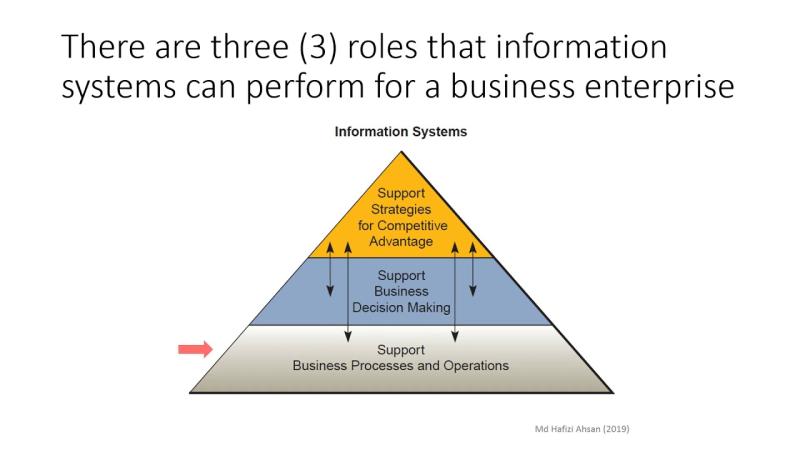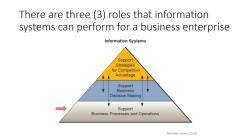What are the roles of Information Systems?
Information Systems (IS) play vital roles in organizations by managing and processing information to support various business functions and decision-making processes. The roles of information systems can be broadly categorized into several key functions:
Data Management:
- Data Collection: Information systems collect and store data from various sources, including transactions, sensors, and user inputs.
- Data Storage: They provide databases and storage systems to organize and store data efficiently.
- Data Retrieval: Information systems enable users to retrieve and access data quickly when needed.
Data Processing:
- Data Transformation: Information systems process raw data into meaningful information through various operations such as sorting, filtering, and calculations.
- Data Analysis: They support analytical processes, including statistical analysis, data mining, and business intelligence, to extract insights and trends from data.
Communication and Collaboration:
- Internal Communication: Information systems facilitate communication within an organization through tools like email, messaging systems, and collaborative platforms.
- External Communication: They support communication with external entities, including customers, suppliers, and partners.
Automation of Business Processes:
- Workflow Management: Information systems automate and streamline business processes by managing workflows, approvals, and task assignments.
- Transaction Processing: They automate routine transactions and data processing tasks, reducing manual effort and minimizing errors.
Decision Support:
- Reporting and Dashboards: Information systems generate reports and dashboards that provide a consolidated view of key performance indicators (KPIs) and metrics.
- Decision Analysis: They assist decision-makers by providing relevant information, simulations, and scenario analyses to support strategic decision-making.
Customer Relationship Management (CRM):
- Customer Data Management: Information systems store and manage customer information, interactions, and preferences.
- Sales and Service Automation: They automate sales processes, customer support, and service delivery to enhance customer satisfaction.
Enterprise Resource Planning (ERP):
- Integrated Business Processes: Information systems support integrated business functions such as finance, human resources, supply chain, and manufacturing through ERP systems.
- Unified Data Management: They provide a centralized database for consistent and synchronized data across various departments.
Knowledge Management:
- Content and Document Management: Information systems assist in organizing and managing documents, files, and other content.
- Collaborative Knowledge Sharing: They facilitate collaboration and knowledge sharing among employees through shared repositories and collaborative tools.
Security and Compliance:
- Access Control: Information systems implement security measures, including user authentication, authorization, and encryption, to protect sensitive information.
- Compliance Management: They assist organizations in adhering to legal and regulatory requirements by enforcing compliance measures.
Strategic Planning and Innovation:
- Technology Planning: Information systems contribute to strategic planning by aligning technology solutions with organizational goals.
- Innovation Support: They play a role in fostering innovation through the adoption of emerging technologies and digital transformation initiatives.
Infrastructure Management:
- Hardware and Software Maintenance: Information systems manage the maintenance and upkeep of hardware, software, and network infrastructure.
- System Integration: They ensure seamless integration between different components of the information technology (IT) infrastructure.
The roles of information systems are dynamic and continue to evolve with technological advancements, emphasizing the critical importance of IT in modern organizations.
What functions do Information Systems serve within organizations?
Information systems play a crucial role in the modern organization, serving a wide range of functions that contribute to its success and efficiency. Here are some of the key functions of information systems:
1. Data Collection and Storage:
- Information systems gather and store data from various sources within the organization, including transactions, customer records, financial data, and operational information.
- This centralized data repository allows for easier access, analysis, and reporting.
2. Information Processing and Analysis:
- Information systems process and analyze the collected data to transform it into meaningful information.
- This can involve calculations, comparisons, trend analysis, and other forms of data manipulation.
- The resulting information helps managers and employees make informed decisions, identify trends, and track performance.
3. Communication and Collaboration:
- Information systems facilitate communication and collaboration between different departments, teams, and individuals within an organization.
- This can involve email, instant messaging, video conferencing, project management tools, and other communication platforms.
- Effective communication leads to better coordination, problem-solving, and decision-making.
4. Automation and Workflow Efficiency:
- Information systems can automate many routine tasks, such as data entry, order processing, and customer service inquiries.
- This frees up employees to focus on more strategic and value-added activities.
- Information systems also streamline workflows by eliminating manual processes and reducing errors.
5. Strategic Decision Making:
- Information systems provide managers and executives with access to real-time data and analytical tools to support strategic decision-making.
- This allows for data-driven decisions based on accurate information and insights.
- Strategic use of information systems can lead to better business planning, competitive advantage, and improved profitability.
6. Customer Relationship Management:
- Information systems enable organizations to track and manage customer interactions, preferences, and purchase history.
- This helps businesses personalize customer experiences, improve service, and build stronger relationships.
- Information systems also support marketing and sales activities by providing insights into customer behavior and preferences.
7. Regulatory Compliance:
- Information systems can help organizations comply with various regulations and industry standards by tracking data, generating reports, and automating compliance processes.
- This reduces the risk of penalties and ensures that the organization operates within legal and ethical boundaries.
8. Competitive Advantage:
- Information systems can give organizations a competitive edge by improving operational efficiency, providing insights into customer behavior, and enabling innovation.
- Businesses that effectively utilize information systems are often more adaptable, responsive, and successful in the marketplace.
Overall, information systems are essential tools for organizations of all sizes and across all industries. By leveraging the capabilities of information systems, organizations can improve their efficiency, effectiveness, and competitiveness.




